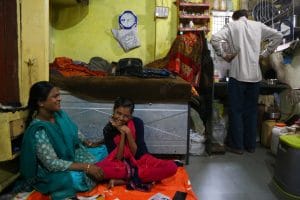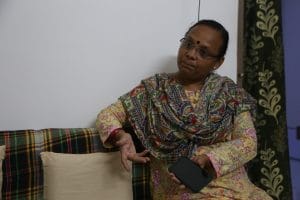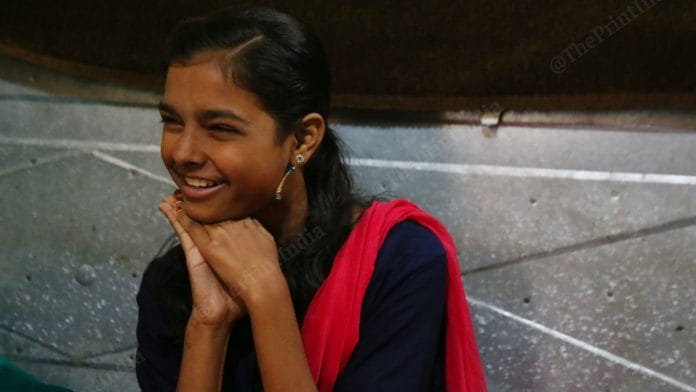The municipal officer is doing the rounds of a dingy, rain-soaked Khandwa neighbourhood to ensure voter ID-Aadhar card linking. He stops at a one-room house and presses the doorbell, which is actually the switch for a lightbulb that goes on and off. Thirteen-year-old Fouziya opens the door.
“Have your parents linked their voter IDs to their Aadhar card?” the officer asks. Fouziya turns to her parents and asks in sign language.
Both her parents are deaf. Learning sign language was as natural to Fouziya as breathing. But she has used her skills beyond the boundaries of family life. She is Khandwa’s sign language assistant at large, a critical bridge between the disabled and the state. From the age of eight, Fouziya has been helping deaf people communicate with government officers and police in this small Madhya Pradesh town.
The teenager knows more about the workings of local government agencies than many lawyers. She’s done the rounds of the collector’s office, the superintendent of police’s office, the local Aadhar seva kendra, and the municipal corporation’s office. She’s applied for bank accounts and passbooks on behalf of those hard of hearing and knows where the ration shops in her town are.
She has exposed injustices such as the cruel treatment of deaf students by teachers at a school in nearby Burhanpur. She stepped in to explain a deaf couple’s problems to the police. She’s only 13, but Fouziya has forced the state machinery to acknowledge how people with disabilities often fall through the cracks.
“Just because they can’t hear doesn’t mean they disappear,” says Fouziya, flanked by her parents. She isn’t just the centre of their world. She’s their window. And of the deaf community in Khandwa and Burhanpur.
Also read: ‘Running out of khadi to stitch’: Meerut flagmaker’s legacy thrives despite ‘poly’ revolution
Growing up in a deaf household
Fouziya’s parents used to drop heavy things on the floor when she was a baby to find out if she could hear. She laughs as she says this.
“I’d be like my friends in school, and like my parents at home,” she explains. “My parents had to talk to my teachers through me to understand!”

They watch her with bright eyes and palpable pride as she speaks with clarity and confidence. A formative moment for them came in 2018, when news spread about teachers at a Burhanpur school regularly hitting deaf students and forcing them to massage their legs.
Fouziya’s father immediately knew that his daughter would be able to help them by taking up the matter with law enforcement agencies. And she did. The case exposed the extent to which children with special needs are treated differently in public schools.
Her parents, Farukh and Femida Mohammed, have kept every news clipping about their daughter in a fat plastic folder, easily accessible in the only almirah in their one-room house.
Fouziya and her parents are well known in the deaf community of about 400 people in Khandwa and Burhanpur, and often receive informal requests for help. Her father has done all kinds of odd jobs, from electrical work to stuffing sofas to repairing pipes. He now helps cut steel in a local workshop, while her mother runs a tea stall next to it. He has helped the deaf in Khandwa and Burhanpur access ration for 12 years now.
“Before the phone, they used to send my father…what are they called… letters?” Fouziya explains. Now, video calls and text messages make it easier to keep in touch and communicate problems. Plus, the advent of platforms like ISH News, in which broadcasters use Indian Sign Language, helps the community keep track of current affairs.
Fouziya has picked up the mantle from her father and is now helping others, but she isn’t trained in formal sign language and has never studied it. Her fluency comes purely from interacting with her parents who met at a coaching centre for the deaf in Indore. Her actions are forcing town authorities to wake up to the infrastructural deficit in accessibility for the differently abled.
The local administration has even appointed an ‘expert’ to liaise with the state—school teacher Anjali Shinde.

Fouziya and Anjali are an organic response to small-town India’s problem of deep and chronic disability inaccessibility, a truth largely unacknowledged or simply ignored. They respond to calls for help from everyone–neighbours, police, lawyers, courts and government officials.
From Aadhar card verification and applying for bank passbooks to helping a speech-impaired rape survivor file a complaint and aiding witnesses to speak in court—the Khandwa duo is ensuring that the deaf are heard.
Also read: Urban planning key to realising rights for persons with disabilities. Learn from Karnataka
Stepping up to solve crimes
The Khandwa police first turned to Fouziya for help in 2017, when she was just eight years old.
A deaf couple wanted to file a complaint. Ruchi Vardhan Misra, Khandwa’s superintendent of police at the time, turned to her team. Was there anyone in town who knows sign language?
A member of her staff told her about Fouziya. Misra sent for her immediately and was struck by Fouziya’s confidence.
“She was definitely not scared of the uniform,” says Misra. “I found her to be smart, given how young she was.”
Fouziya spoke to the deaf couple and informed the police that they were accusing their parents of abuse.
The police now had an ‘expert’ they could call upon.
“Fouziya is a promising, resourceful child with a lot of potential,” says Misra, who keeps in touch with Fouziya and even attended her 10th birthday party. “I’m hopeful she’ll do something for the community at large.”
Also read: Indian banks can’t ignore persons with disabilities. RBI guidelines exist for a reason
Giving back to society
If Fouziya is a crutch for the local police, then Shinde is a trusted fixture in courtrooms.
In 2019, Khandwa district magistrate Tanvi Sundriyal decided to appoint four ‘experts’—two for the visually impaired and two for the hearing impaired.
“The DM’s office is involved in these issues because money, specialist equipment, and the prioritisation of their issues are required to run centres that work with people with disabilities,” says Sundriyal, who is now the CEO of Rural Road Development Authority (RRDA) in Bhopal.
Shinde is one of these experts and currently the only remaining appointee helping the deaf.
She has been teaching in government schools since 1998 and decided to do her second B.Ed. in Special Education in 2015 to help students who were deaf and mute. She was already involved with a hostel for children with special needs in Khandwa when she realised she could add more value with formal training. Shinde was recruited by the DM’s office in 2020 to be a special educator and interpreter.
“Having an expert has really helped us. Shinde follows the case from the station to the court,” says Khandwa superintendent of police Vivek Singh. Plus, it’s important to have an adult—as opposed to a young teenager like Fouziya—to handle sensitive conversations around crimes.
Since 2020, Shinde has handheld deaf victims as they interact with the state. The cases range from misunderstandings to sexual assault. Shinde steps in to help record people’s statements and relay their version of events to the police. Many instances are cases of simple misunderstanding–like when a deaf 16-year-old with learning disabilities accidentally boarded the wrong bus and ended up in Indore–and are usually resolved within a day.
But sexual assault cases take longer in court. Shinde has to take a day off from work and spend all day in court, which is around 60 km from her house.
She is currently the voice for two deaf rape survivors—a 10-year-old girl from Khalwa, and a boy who is in 9th grade. Victim of an apathetic education system, the boy can’t read or write. Shinde had to point to her clothes and use other gestures to confirm his version of events.
The Khalwa case is similarly complicated because the survivor’s mother only knows Korku, a tribal language. An Anganwadi worker was brought in to help Shinde communicate first with the family, and then with the police and lawyers.
“The judges recognise me now,” Shinde says. “I have a degree and I work for the government, so they trust me. But the first thing they still ask me at the court is about my BEd,” she adds.
Also read: How many people with disabilities have a driving licence in Tamil Nadu?: A story in 79 RTIs
The lacuna in special needs education
The government’s sincerity towards scrutinising Shinde’s educational background does not extend to members of the disabled community.
There are no separate schools for children with special needs. The onus falls on educators to use alternative methods of learning to teach such students.
Although there are methods in place, they aren’t always implemented. While the Centre’s Department of Empowerment of Persons with Disabilities has released a ‘sign language dictionary,’ many schools struggle to teach sign language in the absence of resources. A large number of students who graduate class 12 can’t read or write basic English, according to Shinde.
“The problem is that not everyone speaks the same sign language. There’s some amount of guesswork you have to do as a teacher and as an interpreter,” she says.
Moreover, Khandwa hostel for children with special needs closed during the pandemic, forcing students to return to their villages. Shinde worries about their education, considering many of her deaf students already lag behind their average counterparts.
But more than the syllabus or curriculum or lack of resources, it’s the unkind teachers who are a bigger problem. Fouziya’s father was beaten regularly by his teachers.
Though she doesn’t have special needs herself, Fouziya has seen these problems first-hand because of the case she was involved in.
“Indian education is good, both my parents say so,” Fouziya says after a quick conversation with her parents. Her mother went to a deaf school in Indore, while her father was sent to a hostel for children with special needs in Bhopal.
“It’s the teachers who always take advantage,” she says.

Also read:
Rising to the challenge
Fouziya says her parents’ ultimate aspiration for her is to meet the Prime Minister, while she wants to meet her idols from the K-pop group BTS. Until then, she plans to continue with her studies and help as much as she can — including people without any disability.

She turns to her mother to quickly translate her answer. Her mother signs back: what is BTS? Fouziya laughs and responds that her mother won’t get it. Fouziya herself doesn’t always understand what BTS is singing about, but it hardly matters to her.
“You don’t need sign language to show love or care,” she says.
Unlike Shinde, who acts as a go-between for the police and the judiciary, Fouziya’s assistance is more informal — like helping people apply for bank passbooks, government IDs and other financial services. But Shinde hopes that Fouziya will be able to continue doing this work, especially since she is such a community figure.
“It’s amazing that she’s already doing this work at such a young age. My hope is that she graduates Class 12 and chooses formal training so she can help in a formal capacity,” says Shinde.
The lack of state support, however, is an impediment. Shinde had to pay for her second BEd herself. She also attended an eight-day sign language workshop in Bhopal in July, again with her own money. Fouziya would require a lot of self-motivation to continue on this path, says Shinde.
Though the two have quietly gone about offering their services and time to the same agencies, Shinde only heard of Fouziya for the first time through a Dainik Bhaskar article published in August 2022.
Fouziya and Anjali Shinde have never met.
(Edited by Zoya Bhatti)






